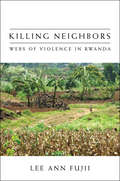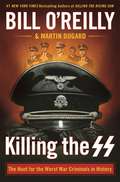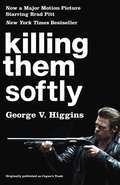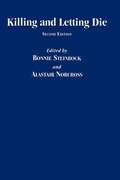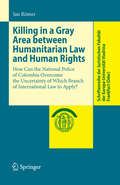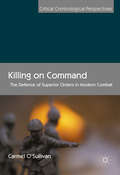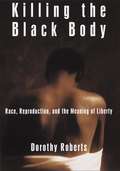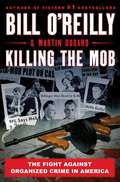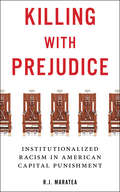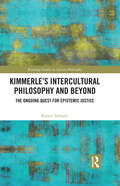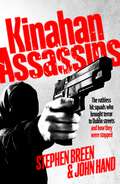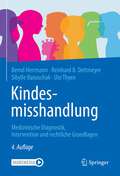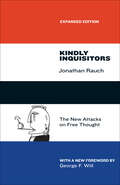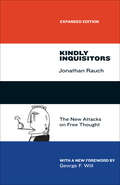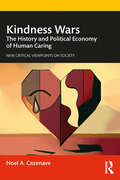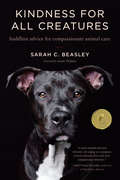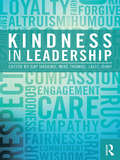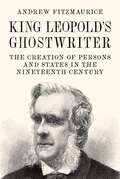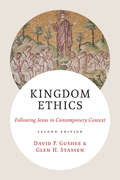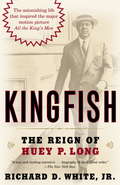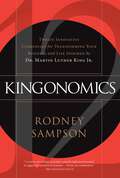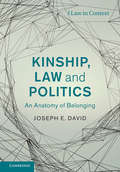- Table View
- List View
Killing Neighbors: Webs of Violence in Rwanda
by Lee Ann FujiiIn the horrific events of the mid-1990s in Rwanda, tens of thousands of Hutu killed their Tutsi friends, neighbors, even family members. That ghastly violence has overshadowed a fact almost as noteworthy: that hundreds of thousands of Hutu killed no one. In a transformative revisiting of the motives behind and specific contexts surrounding the Rwandan genocide, Lee Ann Fujii focuses on individual actions rather than sweeping categories. Fujii argues that ethnic hatred and fear do not satisfactorily explain the mobilization of Rwandans one against another. Extensive interviews in Rwandan prisons and two rural communities from the basics for her claim that mass participation in the genocide was not the result of ethnic antagonisms. Rather, the social context of action was critical. Book jacket.
Killing The SS: The Hunt for the Worst War Criminals in History (Bill O'Reilly's Killing Ser.)
by Bill O'Reilly Martin DugardConfronting Nazi evil is the subject of the latest installment in the mega-bestselling Killing series <P><P>As the true horrors of the Third Reich began to be exposed immediately after World War II, the Nazi war criminals who committed genocide went on the run. A few were swiftly caught, including the notorious SS leader, Heinrich Himmler. Others, however, evaded capture through a sophisticated Nazi organization designed to hide them. Among those war criminals were Josef Mengele, the “Angel of Death” who performed hideous medical experiments at Auschwitz; Martin Bormann, Hitler’s brutal personal secretary; Klaus Barbie, the cruel "Butcher of Lyon"; and perhaps the most awful Nazi of all: Adolf Eichmann. <P><P>Killing the SS is the epic saga of the espionage and daring waged by self-styled "Nazi hunters." This determined and disparate group included a French husband and wife team, an American lawyer who served in the army on D-Day, a German prosecutor who had signed an oath to the Nazi Party, Israeli Mossad agents, and a death camp survivor. Over decades, these men and women scoured the world, tracking down the SS fugitives and bringing them to justice, which often meant death. <P><P>Written in the fast-paced style of the Killing series, Killing the SS will educate and stun the reader. <P><P>The final chapter is truly shocking.
Killing Them Softly (Cogan's Trade Movie Tie-in Edition)
by George V HigginsNow a Major Motion Picture Starring Brad PittJackie Cogan is an enforcer for the mob. When a high-stakes card game is heisted by unknown hoodlums, Cogan is called in to "handle" the problem. Moving expertly and ruthlessly among a variety of criminal hacks, hangers-on, and bigger-time crooks--a classic cast of misfits animated by Higgins's hilarious, cracklingly authentic dialogue--Cogan gets to the root of the problem and, with five consecutive shots from a Smith & Wesson thirty-eight Police Special, restores order to his corner of the underworld.
Killing and Letting Die
by Bonnie Steinbock Alastair NorcrossAvailable in a new digital edition with reflowable text suitable for e-readersThis collection contains twenty-one thought-provoking essays on the controversies surrounding the moral and legal distinctions between euthanasia and "letting die." Since public awareness of this issue has increased this second edition includes nine entirely new essays which bring the treatment of the subject up-to-date. The urgency of this issue can be gauged in recent developments such as the legalization of physician-assisted suicide in the Netherlands, "how-to" manuals topping the bestseller charts in the United States, and the many headlines devoted to Dr. Jack Kevorkian, who has assisted dozens of patients to die. The essays address the range of questions involved in this issue pertaining especially to the fields of medical ethics, public policymaking, and social philosophy. The discussions consider the decisions facing medical and public policymakers, how those decisions will affect the elderly and terminally ill, and the medical and legal ramifications for patients in a permanently vegetative state, as well as issues of parent/infant rights. The book is divided into two sections. The first, "Euthanasia and the Termination of Life-Prolonging Treatment" includes an examination of the 1976 Karen Quinlan Supreme Court decision and selections from the 1990 Supreme Court decision in the case of Nancy Cruzan. Featured are articles by law professor George Fletcher and philosophers Michael Tooley, James Rachels, and Bonnie Steinbock, with new articles by Rachels, and Thomas Sullivan. The second section, "Philosophical Considerations," probes more deeply into the theoretical issues raised by the killing/letting die controversy, illustrating exceptionally well the dispute between two rival theories of ethics, consequentialism and deontology. It also includes a corpus of the standard thought on the debate by Jonathan Bennet, Daniel Dinello, Jeffrie Murphy, John Harris, Philipa Foot, Richard Trammell, and N. Ann Davis, and adds articles new to this edition by Bennett, Foot, Warren Quinn, Jeff McMahan, and Judith Lichtenberg.
Killing in a Gray Area between Humanitarian Law and Human Rights
by Jan RömerArmed forces can be confronted with the problem of correctly classifying a targeted group as one that is or is not party to an armed conflict. In particular, this happens in a context of a high level of violence where a non-international armed conflict is (likely) occurring at the same time, such as in Iraq, Afghanistan, Brazil or Mexico. The difficulty of qualifying the targeted group leads to a legal uncertainty in which it is unclear whether an operation is governed by international humanitarian law or the international law of human rights. The problem is of particular interest when lethal force is resorted to, as killing might be illegal under one of the two branches. The book attempts to provide guidance on how this uncertainty can be overcome. In order to do so, the requirements to kill under IHL and human rights law are analyzed and compared, as well as assessed in concrete operations of the National Police of Colombia who face this problem on a regular basis.
Killing on Command
by Carmel O'SullivanThis book explores the unique social and environmental factors which influence soldiers to commit war crimes. With a focus on decision-making processes, this monograph provides a significant interdisciplinary analysis of how soldiers decide to follow the commands of their superior officers, even if that means acting illegally. Making the key distinction between normal civilian society and the shocking realities of war, the author facilitates the reader with a comprehensive understanding of what a front-line soldier faces in contemporary combat situations. Killing on Command presents the limits of the law in preventing the occurrence of war crimes. Realistic and practical measures for armed conflict, including the regulation and prevention of violence, and the just implementation of legal standards are all questioned and examined in depth. Given a current focus on the regulation of conduct in war, and the recent prosecution of soldiers, this book will be of particular interest to scholars in the fields of criminology and international relations, as well as policy-makers.
Killing the Black Body: Race, Reproduction and the Meaning of Liberty
by Dorothy RobertsThis is a no-holds-barred response to the liberal and conservative retreat from an assertive, activist, and socially transformative civil rights agenda of recent years--using a black feminist lens and the issue of the impact of recent legislation, social policy, and welfare "reform" on black women's--especially poor black women's--control over their bodies' autonomy and their freedom to bear and raise children with respect and dignity in a society whose white mainstream is determined to demonize, even criminalize their lives. It gives its readers a cogent legal and historical argument for a radically new, and socially transformative, definition of "liberty" and "equality" for the American polity from a black feminist perspective.
Killing the Mob: The Fight Against Organized Crime in America (Bill O'Reilly's Killing Series)
by Bill O'Reilly Martin DugardInstant #1 New York Times, Wall Street Journal, and Publishers Weekly bestseller!In the tenth book in the multimillion-selling Killing series, Bill O’Reilly and Martin Dugard take on their most controversial subject yet: The Mob.Killing the Mob is the tenth book in Bill O'Reilly's #1 New York Times bestselling series of popular narrative histories, with sales of nearly 18 million copies worldwide, and over 320 weeks on the New York Times bestseller list.O’Reilly and co-author Martin Dugard trace the brutal history of 20th Century organized crime in the United States, and expertly plumb the history of this nation’s most notorious serial robbers, conmen, murderers, and especially, mob family bosses. Covering the period from the 1930s to the 1980s, O’Reilly and Dugard trace the prohibition-busting bank robbers of the Depression Era, such as John Dillinger, Bonnie & Clyde, Pretty Boy Floyd and Baby-Face Nelson. In addition, the authors highlight the creation of the Mafia Commission, the power struggles within the “Five Families,” the growth of the FBI under J. Edgar Hoover, the mob battles to control Cuba, Las Vegas and Hollywood, as well as the personal war between the U.S. Attorney General Bobby Kennedy and legendary Teamsters boss Jimmy Hoffa.O’Reilly and Dugard turn these legendary criminals and their true-life escapades into a read that rivals the most riveting crime novel. With Killing the Mob, their hit series is primed for its greatest success yet.
Killing with Prejudice: Institutionalized Racism in American Capital Punishment
by R.J. MarateaA history of the McCleskey v. Kemp Supreme Court ruling that effectively condoned racism in capital cases In 1978 Warren McCleskey, a black man, killed a white police officer in Georgia. He was convicted by a jury of 11 whites and 1 African American, and was sentenced to death. Although McCleskey’s lawyers were able to prove that Georgia courts applied the death penalty to blacks who killed whites four times as often as when the victim was black, the Supreme Court upheld the death sentence in McCleskey v.Kemp, thus institutionalizing the idea that racial bias was acceptable in the capital punishment system. After a thirteen-year legal journey, McCleskey was executed in 1991. In Killing with Prejudice, R.J. Maratea chronicles the entire litigation process which culminated in what has been called “the Dred Scott decision of our time.” Ultimately, the Supreme Court chose to overlook compelling empirical evidence that revealed the discriminatory manner in which the assailants of African Americans are systematically undercharged and the aggressors of white victims are far more likely to receive a death sentence. He draws a clear line from the lynchings of the Jim Crow era to the contemporary acceptance of the death penalty and the problem of mass incarceration today. The McCleskey decision underscores the racial, socioeconomic, and gender disparities in modern American capital punishment, and the case is fundamental to understanding how the death penalty functions for the defendant, victims, and within the American justice system as a whole.
Kimmerle’s Intercultural Philosophy and Beyond: The Ongoing Quest for Epistemic Justice (Routledge Studies in African Philosophy)
by Renate SchepenThis book offers a concise overview of the development of intercultural philosophy since the early 1990s, focusing on one of its key pioneers Heinz Kimmerle (1930-2016). Building on influences from Gadamer, Heidegger and Derrida, Kimmerle’s approach to intercultural philosophy is radical and fosters epistemic justice. Kimmerle critically reflected on his own western philosophical tradition, highlighting the problems of a discourse based on a dominant concept of rationality, and of excluding different approaches and participants. Instead, Kimmerle developed an alternative way of thinking, emphasising the importance of recognising philosophies of different cultures. He focused particularly on African philosophies in academic discourse. In the book, the many layers of Kimmerle’s intercultural philosophy are revealed, exploring how dialectics, hermeneutics, deconstruction and decolonization can contribute to epistemic justice. The author goes beyond Kimmerle and demonstrates how Kimmerle’s approach can be further enhanced by using an intersectional approach and by engaging in dialogue with female philosophers and artists. This new study, which also introduces unpublished and untranslated texts from Kimmerle's work in German and Dutch, will be of considerable interest to researchers of continental philosophy, intercultural and African philosophy, political philosophy, decolonial and feminist studies.
Kinahan Assassins: The Ruthless Hit Squads Who Brought Terror To Dublin Streets And How They Were Stopped
by Stephen Breen John HandTHE NO. 1 BESTSELLER‘Grim, forensic and often eye-opening … meticulously researched and soberly written’ Sunday Independent‘A fascinating book’ Pat Kenny, Newstalk---Kinahan Assassins is the extraordinary story of how the killers used by Ireland’s most notorious drug gang, the Kinahan Cartel, were taken down.After an audacious assassination attempt on boss Daniel Kinahan's life, the Kinahan Cartel recruited an unprecedented number of killers to retaliate against their attackers, the Hutch gang. Kinahan Assassins is the compelling behind-the-scenes account of one man's thirst for vengeance and how it proved fatal for his organization.Kinahan Assassins has the stories of the men who killed for the cartel - including vulnerable drug addicts, a former British soldier, an MMA fighter and an invisible 'Mr Nobody' who acted as a cartel quartermaster - as well as those who gave them orders.And it details how, one by one, the hit teams were identified, surveilled and captured by the Irish police. Featuring new and exclusive material – conversations from wiretaps, insights from gardaí at the heart of the operations and interviews with the loved ones of innocents caught in the crossfire – Kinahan Assassins is a startling and gripping read that throws a new light on the war on organized crime.
Kind and Unusual Punishment: The Prison Business
by Jessica MitfordJessica Mitford gives an in-depth analysis of how prisons function in society.
Kinder als „Ersatzteillieferanten“ im rechtlichen Kontext: Von der Nabelschnurblutspende zur Selektion von Retterkindern (Veröffentlichungen des Instituts für Deutsches, Europäisches und Internationales Medizinrecht, Gesundheitsrecht und Bioethik der Universitäten Heidelberg und Mannheim #50)
by Alena JerrentrupIn einer erstmaligen Gesamtdarstellung widmet sich dieses Buch der Frage, ob und gegebenenfalls inwieweit es zulässig ist, Kinder als Spender von Körperbestandteilen heranzuziehen oder sogar eigens zu diesem Zweck zu zeugen. Den Ausgangspunkt bildet dabei das Spannungsverhältnis, dass die Kinder zwar zunächst den Befugnissen der Eltern unterstehen, diese jedoch die kindlichen Interessen nicht unberücksichtigt lassen dürfen und elterliche Entscheidungsbefugnisse überdies mit Heranwachsen des Kindes zunehmend in den Hintergrund treten müssen. Die je nach Spendekonstellation unterschiedlich intensiven Eingriffe in die kindlichen Rechte, aber auch die verschiedenen Abstufungen eines möglichen Nutzens für das Spenderkind werden herausgearbeitet und mit Blick auf ihre medizinischen, ethischen und rechtlichen Implikationen analysiert. Zudem wird geprüft, ob in Deutschland derzeit eine widerspruchsfreie Rechtslage hinsichtlich der Erlaubnis respektive des Verbots einzelner Spendeformen durch Kinder existiert oder Handlungs- bzw. Harmonisierungsbedarf besteht. Die untersuchten Rechtsgebiete erstrecken sich vom Medizin- über das Zivil-, hier insbesondere das Familienrecht, bis hin zum Verfassungsrecht; der thematische Bogen reicht dabei von Neugeborenen bis Jugendlichen, Eigen- bis Fremdspenden, Blut- bis Organspenden und schließlich bis hin zur höchst umstrittenen Selektion sog. „Retterkinder” mittels PID.
Kindesmisshandlung: Medizinische Diagnostik, Intervention und rechtliche Grundlagen
by Bernd Herrmann Reinhard B. Dettmeyer Sibylle Banaschak Ute ThyenDas bewährte Fachbuch zum Kinderschutz in der Medizin bietet Strategien für den Umgang mit Verdachtsfällen von Kindesmisshandlung und -vernachlässigung, fundierte fachliche Grundlagen für die Diagnose, Sicherheit in Rechtsfragen und erprobte Konzepte für die Intervention. Fundierte somatische Diagnostik Leitliniengerecht, hohe EvidenzRationale diagnostische StrategienForensische BefundsicherungKinder- und jugendgynäkologische Grundlagen Umsichtige Intervention & Prävention Gesprächsführung mit Eltern, Kindern und JugendlichenInterdisziplinäre Netzwerke schaffen und nutzenFrühe Hilfen und KinderschutzSchutzkonzepte für den Umgang mit Missbrauch in Institutionen Gesellschaftliche und rechtliche Grundlagen Auszüge wichtigster GesetzeGesetzlicher Opferschutz, psychosoziale Folgen Kompakt und praxisrelevant Korrekte Anamnese und DokumentationMerkblätter, Checklisten, InternetadressenPraxistipps, Differenzialdiagnosen und Fallstricke Vom „unguten Gefühl“ zu evidenzbasiertem Handeln. Unter Berücksichtigung der aktuellen Literatur, Gesetze und Rechtsprechung sowie der neuen nationalen AWMF S3+ Kinderschutzleitlinie und internationaler Leitlinien. Das erste deutschsprachige Handbuch für fachgerechte medizinische Diagnostik und Intervention. Das notwendige „Handwerkszeug“ für Ärzte und andere Gesundheitsberufe, um in der täglichen Praxis die richtigen Entscheidungen zu treffen. Als bewährter Leitfaden, Ratgeber und Nachschlagewerk für Ärzte, aber auch alle anderen beteiligten Fachleute im Kinderschutz: Juristen, Polizei, Jugendämter, Beratungsstellen. Mit allen relevanten Inhalten für Basis- und Aufbaukurs des Zertifikatslehrganges Kinderschutzmedizin der Deutschen Gesellschaft für Kinderschutz in der Medizin (DGKiM).Mit eLernkarten „Flashcards“ zur Vorbereitung auf die Zertifikatsprüfung Kinderschutzmedizin der DGKiM.
Kindly Inquisitors: The New Attacks on Free Thought
by Jonathan Rauch“A liberal society stands on the proposition that we should all take seriously the idea that we might be wrong. This means we must place no one, including ourselves, beyond the reach of criticism; it means that we must allow people to err, even where the error offends and upsets, as it often will.” So writes Jonathan Rauch in Kindly Inquisitors, which has challenged readers for more than twenty years with its bracing and provocative exploration of the issues surrounding attempts to limit free speech. In it, Rauch makes a persuasive argument for the value of “liberal science” and the idea that conflicting views produce knowledge within society. In this expanded edition of Kindly Inquisitors, a new foreword by George F. Will strikingly shows the book’s continued relevance, while a substantial new afterword by Rauch elaborates upon his original argument and brings it fully up to date. Two decades after the book’s initial publication, while some progress has been made, the regulation of hate speech has grown domestically—especially in American universities—and has spread even more internationally, where there is no First Amendment to serve as a meaningful check. But the answer to bias and prejudice, Rauch argues, is pluralism—not purism. Rather than attempting to legislate bias and prejudice out of existence or to drive them underground, we must pit them against one another to foster a more vigorous and fruitful discussion. It is this process that has been responsible for the growing acceptance of the moral acceptability of homosexuality over the last twenty years. And it is this process, Rauch argues, that will enable us as a society to replace hate with knowledge, both ethical and empirical. “It is a melancholy fact that this elegant book, which is slender and sharp as a stiletto, is needed, now even more than two decades ago. Armed with it, readers can slice through the pernicious ideas that are producing the still-thickening thicket of rules, codes, and regulations restricting freedom of thought and expression.”—George F. Will, from the foreword
Kindly Inquisitors: The New Attacks on Free Thought, Expanded Edition
by Jonathan Rauch"A liberal society stands on the proposition that we should all take seriously the idea that we might be wrong. This means we must place no one, including ourselves, beyond the reach of criticism; it means that we must allow people to err, even where the error offends and upsets, as it often will. ” So writes Jonathan Rauch in Kindly Inquisitors, which has challenged readers for more than twenty years with its bracing and provocative exploration of the issues surrounding attempts to limit free speech. In it, Rauch makes a persuasive argument for the value of "liberal science” and the idea that conflicting views produce knowledge within society. In this expanded edition of Kindly Inquisitors, a new foreword by George F. Will strikingly shows the book’s continued relevance, while a substantial new afterword by Rauch elaborates upon his original argument and brings it fully up to date. Two decades after the book’s initial publication, while some progress has been made, the regulation of hate speech has grown domestically--especially in American universities--and has spread even more internationally, where there is no First Amendment to serve as a meaningful check. But the answer to bias and prejudice, Rauch argues, is pluralism--not purism. Rather than attempting to legislate bias and prejudice out of existence or to drive them underground, we must pit them against one another to foster a more vigorous and fruitful discussion. It is this process that has been responsible for the growing acceptance of the moral acceptability of homosexuality over the last twenty years. And it is this process, Rauch argues, that will enable us as a society to replace hate with knowledge, both ethical and empirical. "It is a melancholy fact that this elegant book, which is slender and sharp as a stiletto, is needed, now even more than two decades ago. Armed with it, readers can slice through the pernicious ideas that are producing the still-thickening thicket of rules, codes, and regulations restricting freedom of thought and expression. ”--George F. Will, from the foreword
Kindness Wars: The History and Political Economy of Human Caring
by Noel A. CazenaveKindness Wars rescues our understanding of kindness from the clutches of an intellectually and morally myopic popular psychology and returns it to the stage of big ideas, in keeping with the important Enlightenment-era debates about human nature and possibilities. Cazenave conceptualizes kindness not just as a benevolent feeling, a caring thought, or a generous action but as a worldview, a theory, or an ideology that explains who we are and justifies how we treat others. Here “kindness wars” refer to the millennia-old “kindness theory” and ideological conflicts over what kind of societies humans can and should have. The book’s title denotes the two types of kindness wars it analyzes, conflict over (1) whether to be kind or not (i.e., the conflicts between kindness and other societal values and ideologies) and (2) what it means to be kind (i.e., the wars within kindness over different ideas as to what it means to be kind and to whom). Using a conflict theoretical perspective, Kindness Wars examines the history of the kindness concept; its many struggles with opposing notions of our true nature and possibilities; and what the lessons of that history and those battles offer us toward the development of a large, robust, and politically engaged conceptualization of kindness.
Kindness for All Creatures: Buddhist Advice for Compassionate Animal Care (Trilogy of Rest)
by Sarah C. BeasleyA heartfelt guide to compassionate care for animals from a Buddhist perspective, with practical advice for mindfully raising pets and honoring animals.Are you doing all you can for the well-being of your beloved pet? Is your outlook toward wildlife consistent with your loyalty to cats and dogs? Structured around the Six Perfections of Buddhism, this book explores these questions and more, providing heartfelt guidance on how to apply compassion in action to our relationships with animals. In addition to being a practical resource, it encourages advocacy, challenging us to think more profoundly about caring for the creatures—both domestic and wild—with whom we share our world.
Kindness in Leadership
by Michael Thomas Gay Haskins Lalit JohriIn a global climate of increasing complexity and uncertainty, there have been calls for a more responsible form of leadership in business and society. The relationship between kindness and leadership is therefore a topic of fundamental importance for our well-being as individuals, for the success of our organisations, and for the future of our global community. Kindness in Leadership is one of the first books to explore both the concept and practice of kindness in leadership and consider them in different societal and organisational settings. Its uniqueness lies in combining an innovative mix of personal views from leaders with explorations of organisational philosophies and practices. It opens with a definition of kindness and its contours and underpinnings. It then explores the importance of kindness within different organisations, parts of the world, economic strata, age groups and genders, drawing on research on organisational compassion and neuroscience. In order to support learning, each chapter is supported by a series of questions for consideration and discussion. This will be a stimulating and thought-provoking read for a wide audience of practicing managers and leaders in organisations of all shapes and sizes, for academics involved in educating for leadership, and for students aspiring to develop their own kind and compassionate leadership style.
King Leopold's Ghostwriter: The Creation of Persons and States in the Nineteenth Century
by Andrew FitzmauriceA dramatic intellectual biography of Victorian jurist Travers Twiss, who provided the legal justification for the creation of the brutal Congo Free StateEminent jurist, Oxford professor, advocate to the Archbishop of Canterbury, Travers Twiss (1809–1897) was a model establishment figure in Victorian Britain, and a close collaborator of Prince Metternich, the architect of the Concert of Europe. Yet Twiss&’s life was defined by two events that threatened to undermine the order that he had so stoutly defended: a notorious social scandal and the creation of the Congo Free State. In King Leopold&’s Ghostwriter, Andrew Fitzmaurice tells the incredible story of a man who, driven by personal events that transformed him from a reactionary to a reformer, rewrote and liberalised international law—yet did so in service of the most brutal regime of the colonial era.In an elaborate deception, Twiss and Pharaïlde van Lynseele, a Belgian prostitute, sought to reinvent her as a woman of suitably noble birth to be his wife. Their subterfuge collapsed when another former client publicly denounced van Lynseele. Disgraced, Twiss resigned his offices and the couple fled to Switzerland. But this failure set the stage for a second, successful act of re-creation. Twiss found new employment as the intellectual driving force of King Leopold of Belgium&’s efforts to have the Congo recognised as a new state under his personal authority. Drawing on extensive new archival research, King Leopold&’s Ghostwriter recounts Twiss&’s story as never before, including how his creation of a new legal personhood for the Congo was intimately related to the earlier invention of a new legal personhood for his wife.Combining gripping biography and penetrating intellectual history, King Leopold&’s Ghostwriter uncovers a dramatic, ambiguous life that has had lasting influence on international law.
Kingdom Ethics, 2nd ed.: Following Jesus in Contemporary Context
by David P. Gushee Glen H. Stassen"Kingdom Ethics is arguably the most significant and comprehensive Christian ethics textbook of our time.&” — Michelle A. Clifton-Soderstrom, North Park Theological SeminaryChristian churches across the spectrum, and Christian ethics as an academic discipline, are often guilty of evading what Jesus actually said about moral life, focusing instead on other biblical texts or traditions. This evasion of Jesus has seriously malformed Christian moral witness—which Jesus said is tested by whether we put his words &“into practice.&”David Gushee and Glen Stassen&’s Kingdom Ethics is the leading Christian introductory ethics textbook for the twenty-first century. Solidly rooted in Scripture—and uniquely focusing on Jesus&’s teachings in the Sermon on the Mount—the book has offered students, pastors, and other readers a comprehensive and challenging framework for Christian ethical thought. Writing to recenter Christian ethics in Jesus Christ, Gushee and Stassen focus on the meaning of the Kingdom of God, perennial themes of moral authority and moral norms, and all the issues raised by the Sermon on the Mount—such as life and death, sexual and gender ethics, love and justice, truth telling, and politics.This second edition of Kingdom Ethics is substantially revised by Gushee and features enhanced and updated treatments of all major contemporary ethical issues—including updated data and examples, a more global perspective, gender-inclusive language, a clearer focus on methodology, discussion questions for every chapter, and a detailed new glossary.Kingdom Ethics is for readers anywhere wanting a robust, comprehensive understanding of Christian ethics founded on the concrete teachings of Jesus and will equip them for further exploration into the field.
Kingdom Ethics, 2nd ed.: Following Jesus in Contemporary Context
by David P. Gushee Glen H. Stassen"Kingdom Ethics is arguably the most significant and comprehensive Christian ethics textbook of our time.&” — Michelle A. Clifton-Soderstrom, North Park Theological SeminaryChristian churches across the spectrum, and Christian ethics as an academic discipline, are often guilty of evading what Jesus actually said about moral life, focusing instead on other biblical texts or traditions. This evasion of Jesus has seriously malformed Christian moral witness—which Jesus said is tested by whether we put his words &“into practice.&”David Gushee and Glen Stassen&’s Kingdom Ethics is the leading Christian introductory ethics textbook for the twenty-first century. Solidly rooted in Scripture—and uniquely focusing on Jesus&’s teachings in the Sermon on the Mount—the book has offered students, pastors, and other readers a comprehensive and challenging framework for Christian ethical thought. Writing to recenter Christian ethics in Jesus Christ, Gushee and Stassen focus on the meaning of the Kingdom of God, perennial themes of moral authority and moral norms, and all the issues raised by the Sermon on the Mount—such as life and death, sexual and gender ethics, love and justice, truth telling, and politics.This second edition of Kingdom Ethics is substantially revised by Gushee and features enhanced and updated treatments of all major contemporary ethical issues—including updated data and examples, a more global perspective, gender-inclusive language, a clearer focus on methodology, discussion questions for every chapter, and a detailed new glossary.Kingdom Ethics is for readers anywhere wanting a robust, comprehensive understanding of Christian ethics that is founded on the concrete teachings of Jesus and will equip them for further exploration into the field.
Kingfish: The Reign of Huey P. Long
by Richard D. White Jr.From the moment he took office as governor in 1928 to the day an assassin&’s bullet cut him down in 1935, Huey Long wielded all but dictatorial control over the state of Louisiana. A man of shameless ambition and ruthless vindictiveness, Long orchestrated elections, hired and fired thousands at will, and deployed the state militia as his personal police force. And yet, paradoxically, as governor and later as senator, Long did more good for the state&’s poor and uneducated than any politician before or since. Outrageous demagogue or charismatic visionary? In this powerful biography, Richard D. White, Jr., brings Huey Long to life in all his blazing, controversial glory. White taps invaluable new source material to present a fresh, vivid portrait of both the man and the Depression era that catapulted him to fame. From his boyhood in dirt-poor Winn Parish, Long knew he was destined for power–the problem was how to get it fast enough to satisfy his insatiable appetite. With cunning and crudity unheard of in Louisiana politics, Long crushed his opponents in the 1928 gubernatorial race, then immediately set about tightening his iron grip. The press attacked him viciously, the oil companies howled for his blood after he pushed through a controversial oil processing tax, but Long had the adulation of the people. In 1930, the Kingfish got himself elected senator, and then there was no stopping him.White&’s account of Long&’s heyday unfolds with the mesmerizing intensity of a movie. Pegged by President Roosevelt as &“one of the two most dangerous men in the country,&” Long organized a radical movement to redistribute money through his Share Our Wealth Society–and his gospel of pensions for all, a shorter workweek, and free college spread like wildfire. The Louisiana poor already worshiped him for building thousands of miles of roads and funding schools, hospitals, and universities; his outrageous antics on the Senate floor gained him a growing national base. By 1935, despite a barrage of corruption investigations, Huey Long announced that he was running for president. In the end, Long was a tragic hero–a power addict who squandered his genius and came close to destroying the very foundation of democratic rule. Kingfish is a balanced, lucid, and absolutely spellbinding portrait of the life and times of the most incendiary figure in the history of American politics.
Kingonomics: Twelve Innovative Currencies for Transforming Your Business and Life Inspired by Dr. Martin Luther King Jr.
by Rodney SampsonWhile most know of Dr. Martin Luther King Jr.'s sweeping dream of equality and freedom for all, what many do not realize is just how keenly focused he was on economic issues, particularly in his later years. Dr. King believed without economic opportunity, we do not have the chance to pursue happiness. It was, in fact, while planning the Poor People's March, a dramatic stand on economic issues, that his voice was forever silenced. In his final book, Dr. King posed the question, where do we go from here? The answer lies in Kingonomics, a 21st-century interpretation of his economic vision translated through the eyes of Dr. Rodney Sampson, a globally established economic innovator, business developer, and highly successful serial entrepreneur. With 12 currencies (including service, innovation, and reciprocity), Sampson takes pertinent ideas from the life and works of Dr. King and, by combining them with real-life experiences, produces a guide through which one can realize their full potential and personal power. Success does not discriminate, and the road map to it is contained in the pages of this revolutionary new work.
Kinship, Law and Politics: An Anatomy of Belonging (Law in Context)
by Joseph E. DavidWhy are we so concerned with belonging? In what ways does our belonging constitute our identity? Is belonging a universal concept or a culturally dependent value? How does belonging situate and motivate us? Joseph E. David grapples with these questions through a genealogical analysis of ideas and concepts of belonging. His book transports readers to crucial historical moments in which perceptions of belonging have been formed, transformed, or dismantled. The cases presented here focus on the pivotal role played by belonging in kinship, law, and political order, stretching across cultural and religious contexts from eleventh-century Mediterranean religious legal debates to twentieth-century statist liberalism in Western societies. With his thorough inquiry into diverse discourses of belonging, David pushes past the politics of belonging and forces us to acknowledge just how wide-ranging and fluid notions of belonging can be.
